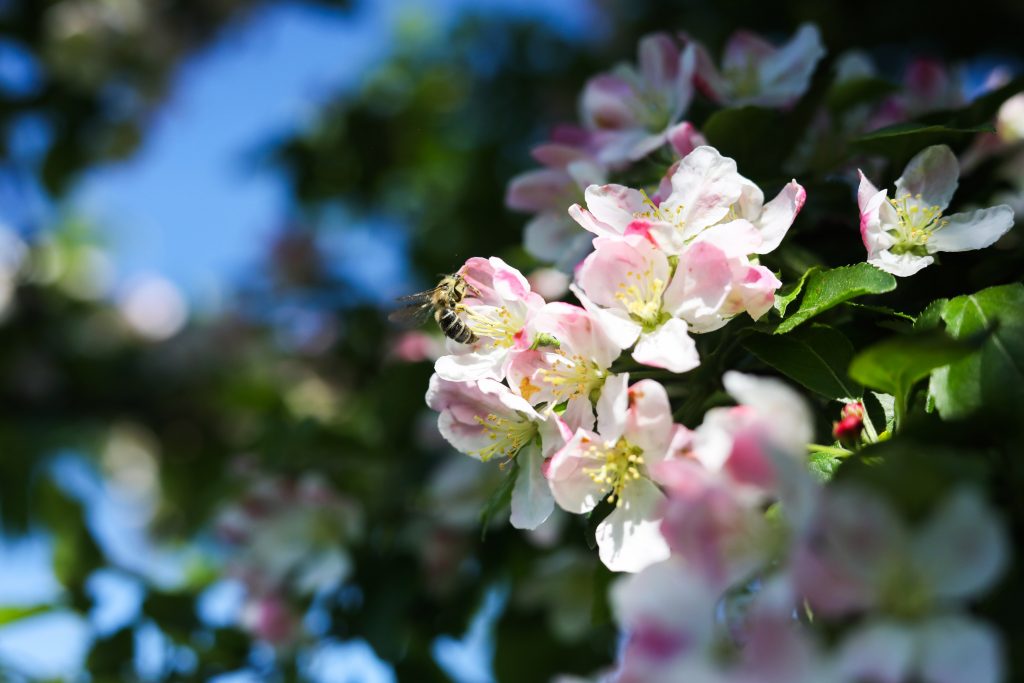During finals week, Binghamton University Bees is planning to take advantage of the warmer weather to install pollinator boxes throughout the Nature Preserve. The boxes, which will serve as shelter for a variety of species, will also aim to educate visitors on local conservation efforts.
BU Bees, which was formed in spring 2018, has previously focused on educational outreach and maintaining a honeybee apiary in Nuthatch Hollow in the Nature Preserve by Bunn Hill Road. Members now hope to create a safer environment for the abundance of native pollinators on BU’s campus.
According to Dylan Gavin, treasurer for BU Bees and a junior majoring in psychology, the club was formed after students voiced concerns about declining bee populations, which have been hindered largely by agriculture and the homogenization of landscapes.
“I understood the issues facing the bee population and wanted to join to help combat some of the situations bees are facing as well as educate the rest of the student body,” Gavin wrote in an email.
The boxes were constructed by Dylan Horvath, steward of natural areas at BU. Horvath wrote in an email that their installation will allow for a more balanced and diverse ecosystem.
“The bee boxes give solitary bees a place to reproduce that may be closer to their food sources and in turn keep flowers reproducing,” Horvath wrote. “Many flowering plants produce food for other animals in the form of fruit or seeds, so pollinators help other life.”
Native pollinators are hindered because they often live in the ground or low-lying plants, where they can be more easily disturbed by land usage, visitors or an overabundance of other species. The overpopulation of deer has been a concern for the Nature Preserve in recent years, as they disrupt balance in the ecosystem by consuming large quantities of these plants.
Sage Daughton, a junior majoring in environmental studies, said she has observed the detrimental effects of overpopulated deer, which consume large quantities of low-lying plants firsthand, while volunteering in the Nature Preserve.
“I think with the increasingly abundant deer populations, the undergrowth of the preserve has been vastly destroyed, and ground-nesting pollinators are disadvantaged,” Daughton said. “The boxes would be advantageous because pollinators propagate plant species and allow flora and fauna to flourish.”
Native plant species, which bees utilize to forage for food, can be lost due to the mowing and manicuring of campus lawns. According to Molly Heit, outreach officer for BU Bees and a junior double-majoring in biochemistry and integrative neuroscience, future projects include creating small pollinator gardens in unmaintained areas near the Nature Preserve. In conjunction with Physical Facilities’ low-mow plan, which would require less frequent mowing of certain campus areas, greater areas for food foraging could help maintain or increase healthy pollinator populations.
“These habitats might not be the main habitats of the native pollinators in the Nature Preserve, but they’ll be available resting grounds,” Heit wrote in an email. “When pollinators are surrounded by available forage, they will be more apt to stick around and pollinate the ecosystems around them.”
In addition to these projects, BU Bees plans to create signage to place in the Nature Preserve that will educate visitors on actions they can take to protecting pollinators at home.
“These solutions range from taking care to prioritize and protect native pollinators, to eating locally and sustainably and planting pollinator gardens,” Heit wrote. “The fine details of how those things get done is the block between knowing and making the difference. So our club is here to start putting some of that knowledge into action.”



